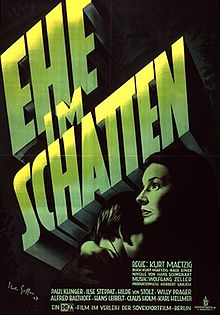- Marriage in the Shadows
-
Ehe im Schatten 
Directed by Kurt Maetzig Produced by Georg Kiaup Written by Hans Scweikart Starring Paul Klinger, Ilse Steppat Music by Alice Ludwig Cinematography Friedl Behn-Grund, Eugen Klagemann Editing by Alice Ludwig Release date(s) 3 October 1947 Running time 104 minutes Country Soviet Occupation Zone Language German Ehe im Schatten (Marriage in the Shadows) is a East German film melodrama, directed by Kurt Maetzig. It was released in 1947 by DEFA. The film was described as an "attempt to confront the German people about the morals of the past", being the first film to to confront the people about the Persecution of the Jews and the atrocities conducted during the World War II.[1][2]
Contents
Plot
Actor Hans Wieland refuses to divorce his actress Jewish wife, Elisabeth, even as extreme pressure is applied on him by the Nazi authorities. He even takes her to a premiere of one of his films where she is unwittingly introduced to a high Nazi Party official. Upon later discovering that the charming woman at the premiere was in fact Jewish, he orders her arrest. Hans Wieland is given an ultimatum by his former friend Herbert Blohm, now a Nazi official at the Reichskulturministerium (culture ministry), to save himself by divorcing his wife. Knowing that his wife will die in a concentration camp, Hans Wieland returns home and they drink poison in coffee whilst reciting the closing scene of Friedrich Schiller's tragic play Kabale und Liebe together. The film ends with a dedication to the real-life actor Joachim Gottschalk who committed suicide with his Jewish wife Meta Gottschalk and their nine-year old son.
Cast
- Paul Klinger: Hans Wieland
- Ilse Steppat: Elisabeth
- Alfred Balthoff: Kurt Bernstein
- Claus Holm: Dr. Herbert Blohm
- Hans Leibelt: Fehrenbach
- Karl Hellmer: Gallenkamp
- Hilde von Stolz: Greta Koch
- Walter Werner: Mr. Hofbauer
- Karl Hannemann: Gestapo agent
- Elly Burgmer: aunt Olga
- Lothar Firmans: state secretary
Production
The screenplay was based on the life and suicide of actor Joachim Gottschalk and his family in 1941.[3][4] However, Maetzig said of the film, "almost everything in the film is based on what I myself, or my family and friends, have experienced."[2] Indeed the character of Kurt Bernstein, portrayed by Alfred Balthoff is strongly based on Maetzig.[2] Maetzig's mother had committed suicide to avoid being caught by the Gestapo.[2] It was the first feature film to be directed by Kurt Maetzig.
Reception
Ehe im Schatten was the only film to be released simultaneously in all the sectors of occupied Berlin, at 3 October 1947. In total, it was viewed by 12 million people, becoming the most successful film produced in the first post-war years and is widely considered one of the best German films of this period.[5]
Maetzig and cinematographer Friedl Behn-Grund received the National Prize of East Germany Second Class for their work.[6] The director was also awarded the first ever Bambi Prize, at 1948.[2]
References
- ^ Feinstein, Joshua (2002). The triumph of the ordinary: depictions of daily life in the East German cinema, 1949-1989. UNC Press Books. p. 26. ISBN 9780807853856. http://books.google.com/books?id=ofoaL7XIJUwC&pg=PA26. Retrieved 6 April 2011.
- ^ a b c d e Allan, Seán; Sandford, John (1999). DEFA: East German cinema, 1946-1992. Berghahn Books. p. 62. ISBN 9781571817532. http://books.google.com/books?id=3xDwYDJlklkC&pg=PA62. Retrieved 6 April 2011.
- ^ Bock, Hans-Michael; Bergfelder, Tim (30 December 2009). The concise Cinegraph: encyclopaedia of German cinema. Berghahn Books. p. 163. ISBN 9781571816559. http://books.google.com/books?id=z7gFT_Duq1cC&pg=PA163. Retrieved 6 April 2011.
- ^ Costabile-Heming, Carol Anne (2001). Textual responses to German unification: processing historical and social change in literature and film. Walter de Gruyter. p. 197. ISBN 9783110170221. http://books.google.com/books?id=18WkxDf8WF4C&pg=PA197. Retrieved 6 April 2011.
- ^ Liehm, Mira; Liehm, Antonín J. (1980). The most important art: Soviet and Eastern European film after 1945. University of California Press. p. 86. ISBN 9780520041288. http://books.google.com/books?id=eGi6ykWT6OkC&pg=PA86. Retrieved 6 April 2011.
- ^ Kino- und Fernseh-Almanach. Henschelverlag Kunst und Gesellschaft.. 1985. p. 7. http://books.google.com/books?id=aXBZAAAAMAAJ. Retrieved 6 April 2011.
External links
Films directed by Kurt Maetzig 1940s' Berlin under Construction (1946) · SPD-KPD Unity (1946) · Marriage in the Shadows (1947) · The Beaverskin (1949)1950s The Council of the Gods (1950) · The Benthin Family (1950) · Story of A Young Couple (1952) · Ernst Thälmann (1954-1955) · Castles and Cottages (1957) · Don't Forget My Little Traudel (1957) · The Sailor's Song (1958)1960s The Silent Star (1960) · September Love (1961) · Captain Loy's Dream (1961) · The Shadow (1961) · At A French Fireside (1963) · Preludio 11 (1963) · The Rabbit Is Me (1965) · The Girl on the Diving Board (1967) · The Banner of Krivoy Rog (1967) · Our Time (1969)1970s Janus Head (1970) · Man Against Man (1976)Cinema of Germany 
Film chronology · German Empire 1895–1918 · Weimar Germany 1919–1933 · Nazi Germany 1933–1945 · East Germany (1945–1990) ·
(West) Germany 1945–present · 1945-1959 · 1960s · 1970s · 1980s · 1990s · 2000s · 2010s
Actors · Directors · Films A–Z · Cinematographers · Festivals · Producers · Composers · ScreenwritersCategories:- 1947 films
- East German films
- German-language films
- Films directed by Kurt Maetzig
- 1940s drama films
- Holocaust films
Wikimedia Foundation. 2010.
